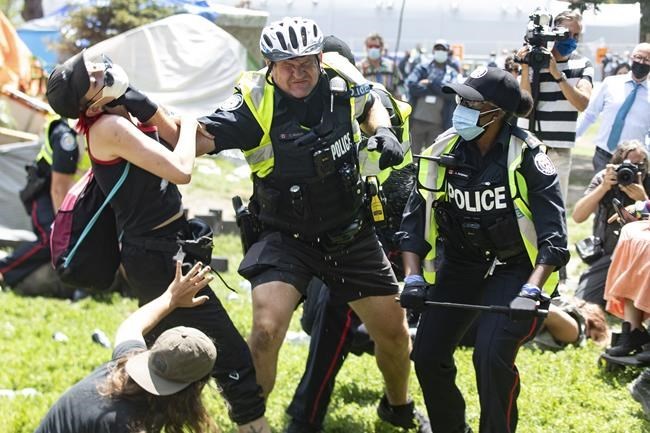TORONTO — Police and politicians' efforts to limit public access to recent events in Toronto and Vancouver Island have cast a spotlight on the role of journalists and spurred concerns over freedom of the press.
The decision by authorities in Toronto to fence off public parks last month as municipal staff and police cleared homeless encampments sparked backlash from media outlets and advocates, who have petitioned the city to allow reporters on site during the operations.
The push for media access in Toronto came on the heels of a court decision that ordered RCMP in British Columbia to allow reporters entry to blockades in Fairy Creek, where demonstrators have been protesting old-growth logging. The judge in that case, which was launched after journalists reported being blocked from the site, found police should only restrict access if there is an operational or safety concern.
In Toronto, the city has moved to dismantle several homeless encampments -- which emerged during the pandemic as many avoided shelters over fears of COVID-19 -- sparking protests and confrontations that have at times erupted into violence.
The Canadian Association of Journalists called the move to bar reporters from Toronto parks during the clearing of the camps "disappointing to witness and wholly unacceptable," and stressed media rights are enshrined in law.
"Stop arresting or threatening reporters for no good reason. That's a red line that cannot be crossed," Brent Jolly, the association's president, said in an email.
Tensions boiled over at Lamport Stadium Park two weeks ago after a large crowd refused to leave the site that authorities had fenced in. Multiple scuffles broke out and police were seen pushing those who didn't comply. By the end of the day, police said 26 people were arrested and charged with offences that included assault with a weapon, assaulting a peace officer and trespassing.
A day earlier, an encampment at Alexandra Park was cleared by city staff and police after a fence was put up. That operation also saw several people arrested, including a photojournalist with The Canadian Press who was escorted out of the closed-off area in handcuffs. He was issued a notice of trespass, which doesn't carry a charge but bars him from returning to the site for 90 days.
A spokesman for the city said staff closed off the parks during the clearings and prevented anyone from going in, "not just media," in order to speak to those living in the encampment, as well as remove tents and debris.
"We understand and appreciate the concerns raised by the media and the role they have in bearing witness and documenting city operations," Brad Ross said in a statement.
He said the city arranged pooled media coverage for the Lamport Stadium operation, which typically allows select members of the media access to an event so they can later share the material they gather with others.
"The pool arrangement was designed to allow media to see the city's actions, while ensuring the safety of all, as well as addressing the sensitivity around privacy," Ross said.
The CAJ's Jolly said, however, that the pool coverage the city set up for the encampment clearing was "inadequate" because it restricted the ability for journalists to "freely cover" evictions taking place in a public park.
"Attempting to control the work of journalists while they are doing their job is entirely inappropriate," he said, adding that a pool arrangement is generally used when there is limited space for press.
"The work journalists do is both professional and conducted in service to the public and any attempts to short-circuit that work is wholly incompatible with the long-standing tradition of a free press in Canada."
Carissima Mathen, a common law professor with the University of Ottawa, said mounting an effective legal challenge to get access to "relatively short-term" events is difficult because it likely won't be possible to get an injunction in time.
"It's possible that you could try and make the case right after the fact to get some kind of declaration, but it's usually not very practical," she said.
Mathen said it is important to consider questions like how far from a fence police and city staff are when they're carrying out their operations, whether reporters can speak with people as they come out, and how long barricades will stay up.
In the case of Fairy Creek, since it had been happening for weeks, those journalists were able to get an injunction to stop the RCMP from barring them from entering the blockades, Mathen said.
Five Toronto councillors who wrote to the city's mayor last month denouncing the "extreme show of force'' during the clearing of encampments said any obstruction of media access to the operations is "undemocratic and unconstitutional.''
This report by The Canadian Press was first published Aug. 4, 2021.
Elena De Luigi, The Canadian Press

